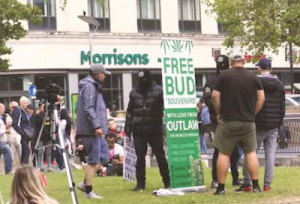Report Criticizes Their Objectives, Ethics, and Dismissal of Public Complaints Says the Santa Barbara Independent.
Here’s their report
A Grand Jury report released Monday blasted the Santa Barbara County Board of Supervisors for its mismanagement of the county’s cannabis production, for dismissing public input, ignoring major environmental impacts, and allowing excessive production, among other criticisms.
“Instead of a balanced approach carefully evaluating how the cannabis industry would be compatible, both as to amount of acreage and location, the board simply opened the floodgates. These ordinances must be amended,” the report states.
Last year, at this time, cannabis farms in Santa Barbara County held 35 percent of all cultivation licenses issued in California last year, despite the county having only 1.8 percent of the state’s land.
An ad hoc committee was formed in 2017 to review and create regulations for adult use and cannabis cultivation in the county, with Supervisors Das Williams and Steve Lavagnino as the only two supervisors on the committee, so it was not subject to the Brown Act and therefore not open to the public.
The committee’s first objective was to “develop a robust and economically viable legal cannabis industry to ensure production and availability of high quality cannabis products to help meet local demands, and, as a public benefit, improve the County’s tax base.” This objective, the report contends, was the wrong one to have.
“This objective became the guiding principle for the board,” the report reads, which is what led the board to more easily justify the environmental impacts — loss of agricultural resources and air quality, greenhouse-gas emissions, and smell. Smell, in particular, sparked massive community outrage and hours of public backlash.
The City of Carpinteria seemed to be hit with cannabis odors the hardest, and on two occasions the school district wrote letters to the board saying Carpinteria High School was being blasted by strong cannabis odors to the point that by afternoon, the students and staff were reporting headaches from the “nauseating odor.” The Santa Ynez Valley also voiced complaints, particularly wineries and tasting rooms that said the skunky odor drove away business.
“This was not an unexpected result of the board’s actions in creating the cannabis ordinances,” the report states. “They knew about the quality of life concerns and chose the revenue potential of cannabis instead.”
The report also cited a slew of ethical issues with the board’s cannabis ordinances, starting with the initial ad hoc committee. “The jury learned that notes and minutes were not prepared in order to avoid any Public Records Act Requests for such documents. The lack of a paper trail does not fit with the concept of open government which seeks input from all interests.”
In addition to the lack of transparency in the ad hoc meetings, the board allowed cannabis industry lobbyists open access during the creation of the ordinances, and the report states that the lobbyists were seen regularly “roaming the halls of the board’s offices.” The report obtained copies of emails from cannabis lobbyists and cannabis growers to boardmembers that were “unnerving.”
“The tone of these emails appeared at times as if to direct specific actions to the board members and gave the perception of an attempt to command instead of recommend,” the report said. “Understanding that no such authority exists with the lobbyists, the Jury felt that limits on such direct conversations should have been established by the board members receiving these emails.”
The report recommends that the Board of Supervisors:
• direct the county planning and development department director to prepare Environmental Impact Reports addressing each region of the county after holding public hearings to evaluate public concerns;
• develop new project objectives for the environmental impact reports that reflect a balance between cannabis, traditional agriculture, and the residents of the county;
• require all future ad hoc committees be open to the public and subject to the Brown Act;
• develop standards that require the supervisors to publicly disclose all access granted to lobbying individuals or groups;
• require all cannabis-related permit applications and licenses pending, who claim legal nonconforming status, to prove their claimed status;
• require all future ordinances involving taxation include the treasurer-tax collector in its creation;
• suspend all unpermitted cannabis operations until proof of odor control is accepted by the Planning Commission;
• establish, staff, and empower an independent ethics oversight commission for Board and its staff;
• require supervisors to publicly disclose campaign contributions from donors who have matters pending before the board;
• and require those members receiving such campaign contributions to recuse themselves from those matters or return the campaign contributions.
The Board of Supervisors has 90 days to respond to the report, which can be read in full at sbcgj.org/2020/Cannabis.pdf.
“The jury believes the Board of Supervisors, in their hubris, failed the people of Santa Barbara County,” the last line of the report reads. “Now they must amend the cannabis ordinances to regain the people’s trust.”
THE REPORT / PDF
Cannabis















